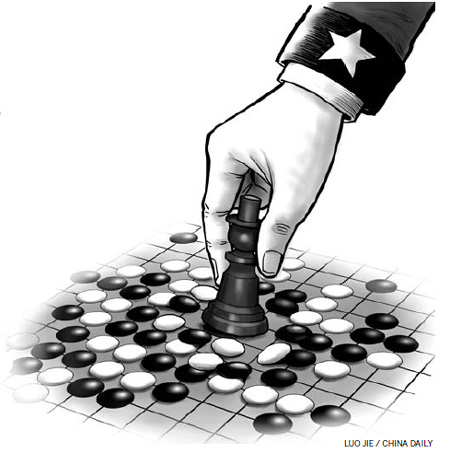Debate: Regional ties
Updated: 2011-12-19 08:10
(China Daily)
|
|||||||||
The earthquake in Japan in March this year and its reaction to the help that China offered reveal Tokyo's circular foreign policy. Its alliance with the US is at the core of Japan's foreign policy, while US allies, or Tokyo's "indirect allies" form the second circle, followed by Southeast Asian countries. In the fourth circle are Russia, India and Mongolia that can counterbalance China.
It is to be noted that countries in all the four circles have strategic interests in containing China. It is this circular foreign policy that prompted Japan to exercise great caution in accepting China's aid. In fact, Japan's selective acceptance of foreign aid is in accordance with its national strategy.
The earthquake in Japan, the floods in Thailand, rising terrorism in Afghanistan after the US announced the withdrawal of its troops and gang-related crimes along the Mekong River are some examples of non-traditional security challenges that the region and China face. And there are indications that such challenges will increase for China.
China will see significant changes in its security environment next year. First, the US, facing intensified competition, will continue its efforts to contain China by forming and consolidating its alliances. And second, since many countries and regions in Asia Pacific will go to the polls in 2012, their internal politics to a large extent will determine their foreign policies.
Not long ago, US Secretary of State Hillary Clinton announced the "US Pacific century" strategy, which is aimed at strengthening American presence in Asia. On the security front, the US will strengthen its alliances to check China's rise. On the economic front, it will further push the Trans-Pacific Partnership, an economic program with strategic considerations. The US intends to have more than its share of the fast economic growth in Asia; it hopes to take the lead in Asia-Pacific cooperation.
Washington participated in the East Asia Summit for the first time this year, and US President Barack Obama used the occasion to take a dig at China's peaceful rise. The US has become more involved in South China Sea disputes, too, especially in the dispute between China and the Philippines.
So a conflict between China, trying to defend its maritime interests, and the US, seeking strategic gains in the South China Sea, seems inevitable. Sovereignty is at the core of China's interests, and it will do anything to safeguard its maritime interests. Therefore, much will depend on the extent to which China's neighboring countries can accept reality.
Next year will also see many countries and regions holding elections. It is probable that new leaders will cater to their electorates by taking a stronger stance against other countries or regions, including China, which may create misunderstandings.
The elections could force the leaders to change their foreign policies, too, and diplomatic measures may not be effective enough to solve some of the thorny issues. That could pose a grave challenge to leaders and diplomats of all countries and regions in the Asia Pacific.
The authors are research scholars at the Institute of Asia-Pacific Studies, affiliated to the Chinese Academy of Social Sciences. This is an excerpt from the annual report to be released soon by the institute's Department of Security and International Relations.












